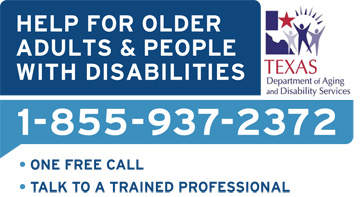The Texas Department of Aging and Disability Services is launching a toll-free number to help qualifying Texans connect with long-term care services.
The telephone number is 1-855-937-2372. It has been set up to help older adults (60 and up) who currently receive Medicaid and/or Medicare, people of all ages with disabilities and caregivers.
The growing population of aging Texans, in addition to the approximately four in 10 Texans who have some type of disability, has created demand for the new number. According to the 2010 census, Texas has the third largest aging population (65 and older) in the United States. More than 3 million Texans are over the age of 65, and that number is expected to more than double to 7.5 million by 2040.
The new number streamlines the process for those seeking information about long-term care services, which include personal care, nursing care, help around the house and help for caregivers.
“Texans who take advantage of the new number will speak with a trained professional who can help identify their needs and put them in touch with service providers in their area,” said Jon Weizenbaum, DADS commissioner. “We think this approach will help Texans receive the services they are eligible for much more efficiently.”
When Texans call the number, they will be routed to a representative at the nearest Aging and Disability Resource Center (ADRC) based on the ZIP code they enter. ADRCs provide information and help connect individuals to state and federal benefits. They are linked to hundreds of service providers statewide and can help Texans enroll for services if requested. ADRC representatives are available Monday through Friday, from 8 a.m. to 5 p.m., and this service is free.
Additionally, the new number will help existing Medicare/Medicaid recipients ensure they are receiving all the long-term care services they are eligible for.
Unlike the Texas 2-1-1 number, which provides broad referral services for all Texans seeking assistance, this new toll-free number is dedicated to older adults, people with disabilities, and caregivers who need long-term care services.


